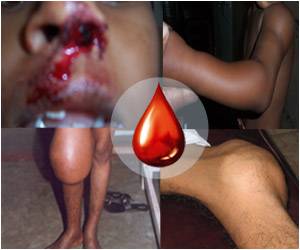Hemophilia A patients experience traumatic bleeding. Emicizumab is an antibody that prevents bleeding and requires less frequent dosing.
- Hemophilia A is characterized by severe bleeding; current standard treatment for the condition requires intravenous administration of clotting factor two or three times a week
- Prolonged administration of clotting factor can result in the development of antibodies (called inhibitors) that attack and destroy them
- A new therapy involving Emicizumab could prevent bleeding episodes in hemophilia patients with inhibitors, according to a phase II clinical trial
Medications called ‘by-passing agents’ are the standard treatment for patients with hemophilia A and inhibitors.
Dr Guy Young, MD, director of the Hemostasis and Thrombosis Program and lead physician for study efforts at Children's Hospital Los Angeles, said, "While the standard medications allow us to 'bypass' the need for Factor VIII, they don't do the job as efficiently or as well for these patients. Bleeding is harder to stop, and episodes last longer and do more damage to the patients. A patient treated with this new therapy had been in a wheelchair for three years because of joint damage from repeated bleeding incidents. Now, he's walking."
Treating Hemophilia Patients with Emicizumab
Emicizumab (ACE910) is a bispecific monoclonal antibody. In phase I study, emicizumab markedly reduced the rate of bleeding among patients with hemophilia A with or without inhibitors.
The first group treated with Emicizumab prophylaxis experienced 87 percent lesser bleeds when compared to the group that did not receive any prophylactic treatment. The third group comprised of participants who had previously received prophylactic treatment with bypassing agents and were now assigned to Emicizumab prophylaxis. The third group experienced 79 percent fewer bleeds compared to prior prophylactic by-passing agents.
- Emicizumab is more effective at preventing severe bleeding in hemophilia A patients
- It has an improved safety profile, according to the study (no anti-drug antibodies were detected)
- Compared to by-passing agents, Emicizumab is easier to administer (subcutaneous) and requires only a once a week dosage
The research team plans to investigate the use of emicizumab in hemophilia A patients without inhibitors. Currently, Emicizumab is only available to patients as part of the clinical trial while the Food and Drug Administration (FDA) is in the process of evaluating the drug.
The study published in the New England Journal of Medicine was presented at the International Society of Thrombosis and Hemostasis.
Hemophilia
Hemophilia A is also known as factor VIII (FVIII) deficiency, which is caused by a defective or missing factor VIII, a clotting protein. Hemophilia occurs in 1 in 5,000 live births. It is a genetic disorder passed down from parents to children. However, one-third of hemophilia cases are caused by a spontaneous mutation.
The standard treatment for hemophilia A is prophylactic intravenous infusions of factor VIII two to three times a week to prevent severe bleeding. Hemophilia A is four times more common than hemophilia B. Most of the patients with hemophilia A experience severe bleeding in case of a cut or injury.
References:
- Gallia G. Levy et al. Emicizumab Prophylaxis in Hemophilia A with Inhibitors. New England Journal of Medicine (2017). DOI: 10.1056/NEJMoa1703068
- Hemophilia A - (https://www.hemophilia.org/Bleeding-Disorders/Types-of-Bleeding-Disorders/Hemophilia-A)














